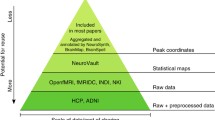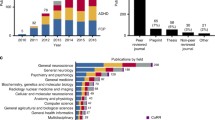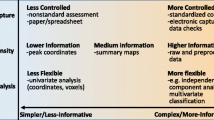Abstract
The degree of complexity of neuroscience data is a sufficient reason both for sharing and for not sharing primary data. Sharing data should make research more efficient and greatly facilitate our understanding of brain function. The intellectual challenges are identical with or without data sharing. Sharing increases the value of the data and provides new knowledge and understanding.



Similar content being viewed by others
References
Chicurel, M. Databasing the brain. Nature 406, 822–825 (2000).
Pechura, C. M. & Martin, J. B. Mapping the Brain and its Functions. Integrating Enabling Technologies into Neuroscience Research (National Academy Press, Washington DC, 1991).
Editorial. Whose scans are they, anyway? Nature 406, 443 (2000).
Aldhous, P. Prospect of data sharing gives brain mappers a headache. Nature 406, 445–446 (2000).
Editorial. A debate over fMRI data sharing. Nature Neurosci. 3, 845–846 (2000).
Van Horn, J. D. & Gazzaniga, M. S. Databasing fMRI studies — towards a 'discovery science' of brain function. Nature Rev. Neurosci. 3, 314–318 (2002).
Koslow, S. H. Should the neuroscience community make a paradigm shift to sharing primary data? Nature Neurosci. 3, 863–865 (2000).
Small, D. H., Mok, S. S. & Bornstein, J. C. Alzheimer's disease and Aβ toxicity: from top to bottom. Nature Rev. Neurosci. 2, 595–598 (2001).
Acknowledgements
This is not an official policy document of the National Institute of Mental Health, National Institutes of Health or the US federal government. It reflects the opinions of the author.
Author information
Authors and Affiliations
Related links
Related links
FURTHER INFORMATION
Alliance for Cellular Signaling
Encyclopedia of Life Sciences
MIT Encyclopedia of Cognitive Sciences
Rights and permissions
About this article
Cite this article
Koslow, S. Sharing primary data: a threat or asset to discovery?. Nat Rev Neurosci 3, 311–313 (2002). https://doi.org/10.1038/nrn787
Issue Date:
DOI: https://doi.org/10.1038/nrn787
- Springer Nature Limited
This article is cited by
-
Test-retest measurements and digital validation for in vivo neuroscience
Scientific Data (2015)
-
S3QL: A distributed domain specific language for controlled semantic integration of life sciences data
BMC Bioinformatics (2011)
-
Interoperability of Neuroscience Modeling Software: Current Status and Future Directions
Neuroinformatics (2007)
-
Successes and Rewards in Sharing Digital Reconstructions of Neuronal Morphology
Neuroinformatics (2007)
-
Mobilizing the base of neuroscience data: the case of neuronal morphologies
Nature Reviews Neuroscience (2006)





